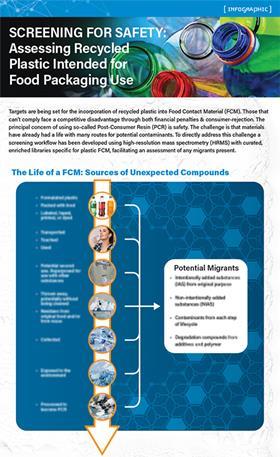Evaluating safety and performance of recycled plastics

Download this free bundle now and explore ways to tackle the challenges we face when screening recycled plastics for safety and material properties.
Over the past few years, plastics have been brought to the forefront of public awareness with the widespread publication of images and data showing the damaging impact of plastic waste. But solving the plastic pollution problem involves involves every part of the plastic value chain – from sourcing to end-of-life. A deep understanding of the chemicals and materials involved as well as trust in analytical equipment is key to ensure performance, quality, and safety are not compromised.

This free-to-download bundle of content, produced by Waters in partnership with academic researchers, will teach you:
- How to assess recycled plastic intended for food packaging use
- The safety challenges of incorporating recycled plastic in food contact materials
- How to evaluate safety and performance of recycled plastics
Your free bundle includes:
- Evaluating safety and performance of recycled plastics – a white paper by Ben MacCreath, Strategic program manager at Waters, examining in detail the drivers for change and the challenges faced when using recycled plastics
- Safety challenges of incorporating recycled plastics in food contact materials – a case study highlighting work from Cristina Nerín, Professor at the University of Zaragoza, Spain, and her research group. Working with Waters, Nerín and her research group have been developing analytical workflows to identify contaminants and impurties in plastics used for food packaging
- Screening for safety: Evaluating safety and performance of recycled plastics – An at-a-glance infographic showcasing a screening workflow that will help you to identify and quantify potential contaminants in recycled plastic products
